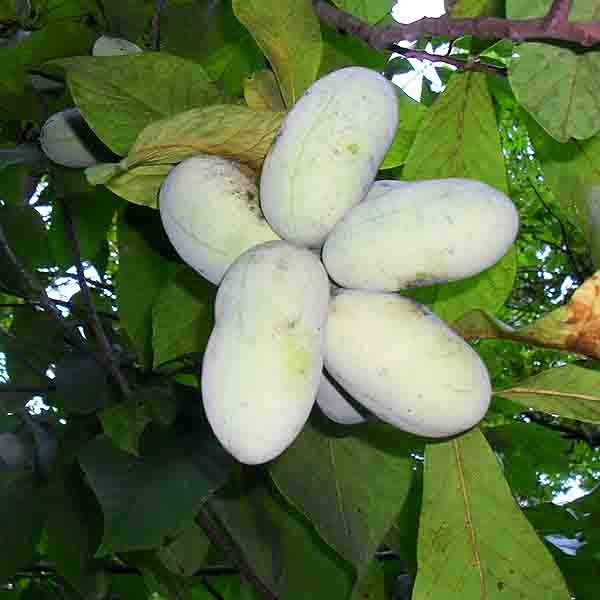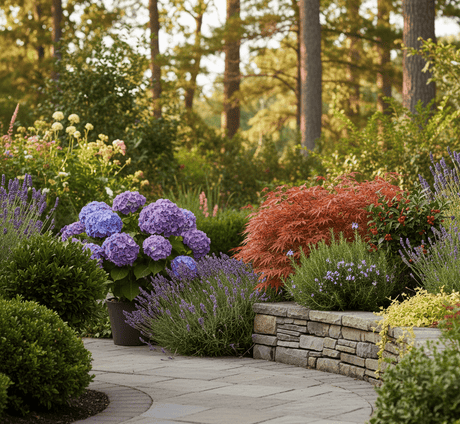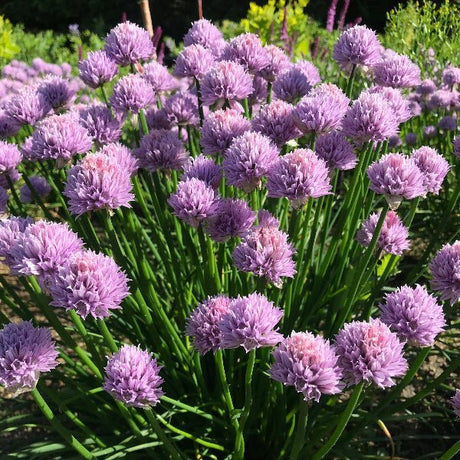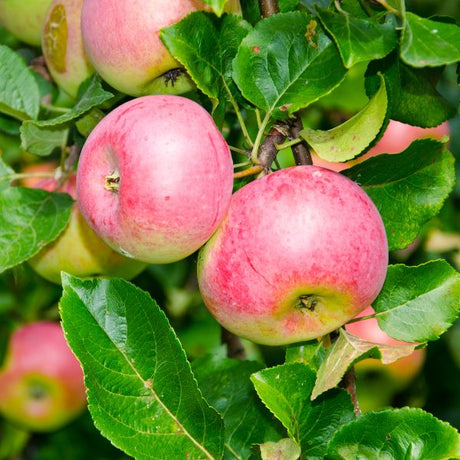Wells Pawpaw Tree
Asimina triloba 'Wells'
Plant Sentry™
Plant Sentry™

Plant Sentry™ Protected
Your order is protected by our compliance system that:
- Prevents restricted plants from shipping to your state
- Ensures plants meet your state's agricultural requirements
- Protects gardens from invasive pests and diseases
Delivery and Shipping
Delivery and Shipping
Delivery and Shipping
Fast, Safe Plant Delivery
Ships in 3-4 business days • Tracking provided • Weather protected
| Under $50 | $9.99 |
| $50 - $99.99 | $14.99 |
| $100 - $149.99 | $16.99 |
| $150 - $198.99 | $24.99 |
| $199+ | FREE |
✓ Zone-specific timing • ✓ Professional packaging • ✓ Health guarantee
Understanding Plant Options
Nature Hills offers plants in two main formats:
- Container Plants: Grown in pots with soil, sized by container volume and plant age
- Bare Root Plants: Dormant plants without soil, sized by height measurements
Container Plant Sizes
Container sizes indicate plant age and growing capacity rather than liquid volume equivalents. Our containers follow industry-standard nursery "trade gallon" specifications, which differ from standard liquid gallon measurements.
Young Plants (6 months to 18 months old)
| Container Size | Actual Volume | Metric Equivalent |
|---|---|---|
| 2" x 2" x 3" | 0.18 - 0.21 dry quarts | 0.20 - 0.23 dry liters |
| 4" Container | 0.31 - 0.87 dry quarts | 0.35 - 0.96 dry liters |
| 4.5" Container | 0.65 dry quarts | 0.72 dry liters |
| 6" Container | 1.4 dry quarts | 1.59 dry liters |
| 1 Quart | 1 dry quart | 1.1 dry liters |
| 5.5" Container | 1.89 dry quarts | 2.08 dry liters |
Established Plants (18 months to 2.5 years old)
| Container Size | Actual Volume | Metric Equivalent |
|---|---|---|
| 2 Quart | 2 dry quarts | 2.2 dry liters |
| #1 Container | 2.26 - 3.73 dry quarts | 2.49 - 4.11 dry liters |
| 5" x 5" x 12" | 3.5 - 4.3 dry quarts | 3.85 - 4.74 dry liters |
Mature Plants (2-4 years old)
| Container Size | Actual Volume | Metric Equivalent |
|---|---|---|
| #2 Container | 1.19 - 1.76 dry gallons | 5.24 - 7.75 dry liters |
| #3 Container | 2.15 - 2.76 dry gallons | 8.14 - 12.16 dry liters |
Large Plants (3-5 years old)
| Container Size | Actual Volume | Metric Equivalent |
|---|---|---|
| #5 Container | 2.92 - 4.62 dry gallons | 12.86 - 20.35 dry liters |
| #6 Container | 5.25 - 6.01 dry gallons | 23.12 - 26.42 dry liters |
| #7 Container | 5.98 - 6.53 dry gallons | 26.34 - 28.76 dry liters |
Bare Root Plants
Bare root plants are sold by height from the root system to the top of the plant. Plants may exceed minimum height requirements.
Common Sizes:
- Trees: 1 foot, 2 feet, 3 feet, 4 feet, 5 feet, 6 feet
- Shrubs & Perennials: 1 foot, 18 inches, 2 feet
Important Notes
Container Volume Specifications
- Trade Gallon Standard: Our containers follow industry-standard "trade gallon" specifications established by the American National Standards Institute (ANSI Z60.1) for nursery stock
- Volume Variations: Actual soil volume may vary due to plant root systems and growing medium settlement
- Age Indicators: Container size primarily indicates plant age and maturity rather than liquid volume equivalents
Growing Conditions
- Plant size can vary based on variety and growing conditions
- Container size helps indicate plant maturity and establishment level
- Larger containers generally mean more established root systems and faster landscape establishment
Seasonal Availability
- Bare root plants are available seasonally when dormant
- Container plants are available throughout the growing season
- Specific varieties may have limited availability in certain sizes
Questions?
For questions about specific plant sizes or availability, please contact our plant experts who can help you choose the right size for your landscape needs.

Plant Sentry™ Protected
Your order is protected by our compliance system that:
- Prevents restricted plants from shipping to your state
- Ensures plants meet your state's agricultural requirements
- Protects gardens from invasive pests and diseases
Plant Profile & Growing Essentials
Cold hardy, Native, Flowering, Edible, Ornamental Berries/Fruit, and Thornless
Specifications
Specifications
-
Botanical Name
-
Height
-
Width
-
Growing Zones
-
Sunlight
-
Growth RateModerate
-
Flower Color
-
Leaf Color
-
Fall Color
-
NativeYes
-
Pollinator Required
-
Bloom PeriodEarly Spring, Late Spring
-
Harvest Time
-
FragrantYes
Planting & Care Instructions
Planting & Care Instructions
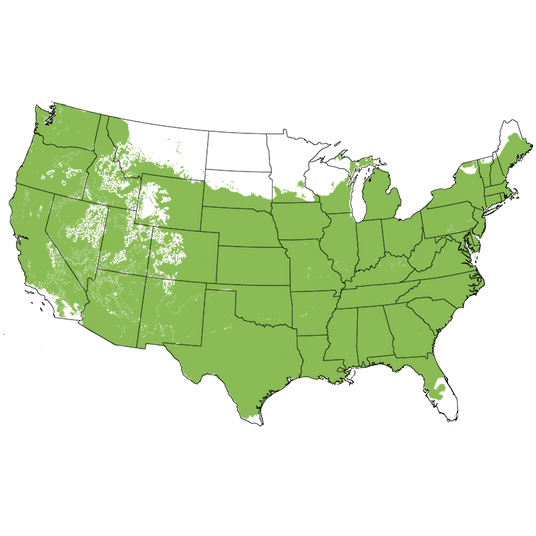
Growing Zones 5-9
Unique Healthy & Oh-So Sweet Wells Pawpaw Tree!
- Unique Yellow-Green Skin
- Large Fruit
- Creamy Orange Flesh
- Honey Sweet Fruity Flavor
- Wine-Red Bell-Shaped Blooms
- Ripens In September
- Good Source For Vitamins & Minerals
- Disease & Pest Resistant
- Ripens In Mid-Late Season
- Delicious Fruit
- Winter Hardy
- Yellow Fall Color
If you haven't ever tried a Pawpaw fruit, the Wells Pawpaw Tree (Asimina triloba 'Wells') might be the one for you! For centuries, First Peoples loved gathering Pawpaws in the fall and enjoyed eating this delicious and nutritious fruit.
It is the largest edible fruit native to the United States but has been largely overlooked. David Wells selected this variety from a stand of wild Pawpaws in Salem, Indiana.
The Wells Pawpaw produces a fruit larger than most, ripening to half to a full pound. It has greenish skin and orange flesh, and its creamy texture has a deliciously fruity hint of bananas. It truly is a well of flavor!
Pawpaw flower in the spring, and Wells produces lovely dark wine-red blooms. Butterflies, bees, and hummingbirds find these striking blooms irresistible! The Pawpaws ripen in September, though closely related to the more tropical Custard-Apples, these North American natives are surprisingly cold hardy!
Despite all the pollinators that will be swarming your tree, Pawpaws are unable to self-pollinate, so you will need to plant a partner that is not genetically similar. Check out our other Pawpaw varieties to use as a pollination partner! You can also hand pollinate them using a small brush.
How to Use Wells Pawpaw Tree In The Landscape
You will only have a short wait to enjoy the fruit of your Wells Pawpaw because it will bear fruit after 2-3 years. Nature Hills is proud to offer mature trees that are already at least 2 years old! Well known for its larger crop, you’ll have loads of delectable fruit to try in all your favorite recipes.
Wells grows vigorously and is a welcomed addition to your garden, orchard, or any sized yard! You will enjoy its dark green foliage in the summer that turns to golden yellow in the fall.
Plant as an exotic-looking specimen or focal point for your front garden beds and borders. A modest-sized tree that fits into most yards and lots and is easily pruned smaller yet.
Keep at full size to cast wonderful shade over your seating areas or plant in rows along property edges for hedges and privacy! Create your own Pawpaw patch to ensure cross-pollination and have loads of unique fruit!
You’ll enjoy these delectable fruits for all your baking and ice cream needs! You’ll make some of the most unique ice cream treats with this custardy sweet fruit! Bake into bread, desserts and custards. Or just eat fresh by scooping the creamy flesh straight from the skin with a spoon! With fewer seeds, the large brown pods are easy to remove.
#ProPlantTips For Care
The Wells Pawpaw is cold hardy down to -20 degrees. It loves most types of soil but prefers well-drained loam that is slightly acidic. Hardy in all of USDA hardiness zones 5 through 9, these tolerate a wide range of growing conditions.
Plant it in full sun for best yields, but then protect the young trees from the full sun until they are well established. If you are using this variety for landscaping, it loves shade because in the wild, these hardy natives are typically understory trees.
Provide consistent moisture during fruiting and during the establishment period. Provide a layer of mulch over the root system to hold in moisture and insulate the roots.
Put your very own Wells Pawpaw and a Pawpaw partner in your cart today before they are sold out. The sooner you plant it, the sooner you will be enjoying the tropical flavor of its fruit and reaping the benefits of its vitamin and mineral-packed flesh.
Don't pass up this tree, with good crops of fruit with an exotic fruity aroma and honey-sweet flavor. Order one of the most unique native fruit trees you’ve never heard of! We’re sure you’ll be the first on the block to have your own Wells Pawpaw tree by ordering at NatureHills.com today!

